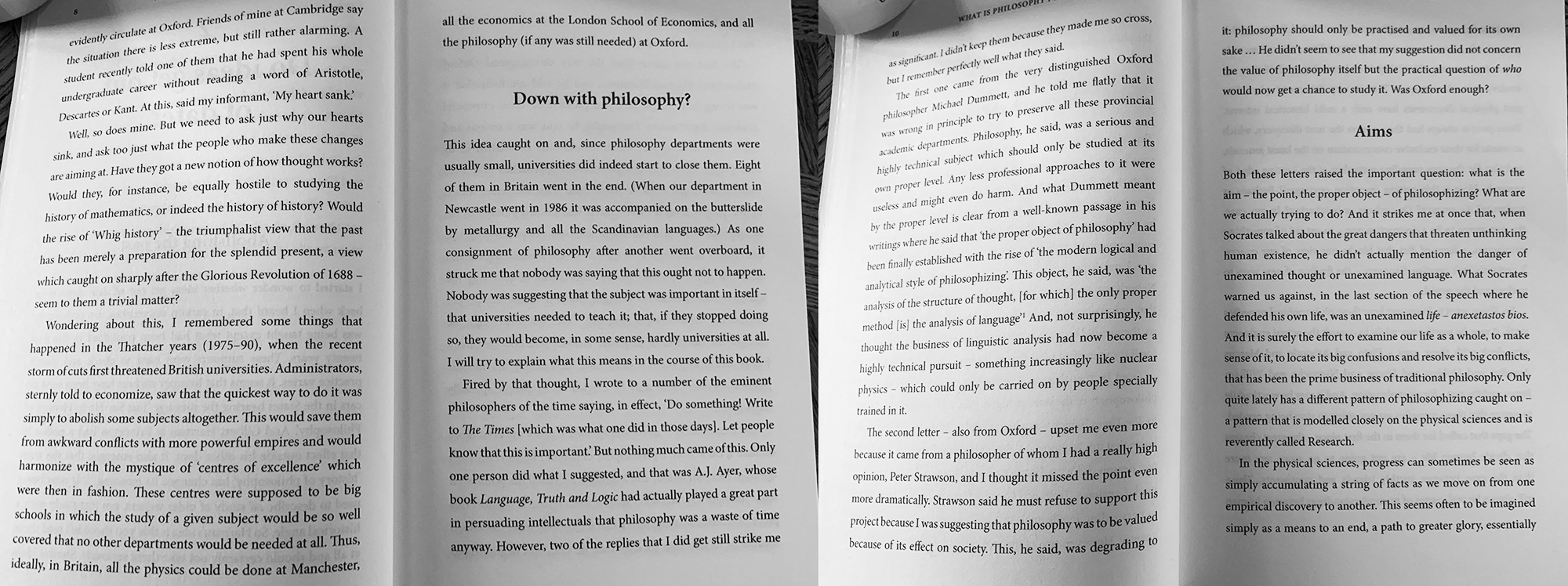Midgley on Dummett & Strawson on Closing Philosophy Departments
He told me flatly that it was wrong in principle to try to preserve all these provincial academic departments. Philosophy, he said, was a serious and highly technical subject which should only be studied at its own proper level. Any less professional approaches to it were useless and might even do harm.
That is Mary Midgley‘s account of Michael Dummett‘s response to her request (probably during the 1980s) that he publicly oppose the closing of philosophy departments at smaller universities around Britain. She recounts it in What Is Philosophy For?. The passage was recently shared online by Helen De Cruz (St. Louis University).
Midgley had asked Peter Strawson for help, too. According to her, he misunderstood her to be concerned primarily with putting forward a position about the value of philosophy instead of the issue of “who would now get a chance to study it”:
Strawson said he must refuse to support this project because I was suggesting that philosophy was to be valued for its effect on society. This, he said, was degrading to it: philosophy should only be practised and valued for its own sake.

[composite of photos taken by Helen De Cruz]
The closure of Philosophy departments was treated as a major scandal and regular news story and there was a big campaign. The National Committee for Philosophy was founded to defend departments—it was eventually transformed into the British Philosophical Association.
Of course, the closure or threatened closure of philosophy departments is a continuing phenomenon, one with seeming increased frequency nowadays owing to the effects of the COVID-19 pandemic on university and college budgets. Midgley’s question is a good one to keep in mind: who should have a chance to study philosophy?



By “study philosophy” you presumably mean to read it, discuss it, write it and have one’s writing criticized by a professional philosopher, and beyond that to obtain degree(s) in the subject. For my part, I hold that these opportunities should be broadly available. (A nonphilosopher.)
re: Dummett’s claim. While I would concede that there are some areas of philosophy that are highly technical, to suppose that these exhaust the discipline is, well, disappointing to say the least — especially given the context. Some philosophers have drifted a long way from the first line of Epicurus’ Letter to Menoeceus — ‘Let no one delay the study of philosophy while young nor weary of it when old. For no one is either too young or too old for the health of the soul.’ One might usefully add ‘too working class’ or any other descriptions suitable to those who attend “provincial” universities.
Undergraduate philosophy courses should not exist, in my opinion. Philosophy should only be taught at graduate level to students who already have a degree in some other subject, any subject. I think Plato would agree.
Yeah yeah. Most art forms should be banned, too.
Even better, folks should just write dissertations without any coursework in philosophy. That way they’ll be able to pontificate about philosophy without knowing anything about it, like Neil deGrasse Tyson and Bill Nye.
I taught philosophy to first generation college students for 45 years, during which they read and discussed, the Oresteia, the Phaedo, Becht’s “Galileo”, Singer on animal rights, Rawls on justice, Sartre on freedom, Camus on Sisyphus, Marx on class struggle, to name just a few. Anyone who claims that these students were undeserving of such discussion or would benefit nothing from them, is undeserving of being taken seriously.
To slightly sidestep the main point of the post for a moment here–
When discussing the closing of philosophy departments, one thing that doesn’t get enough attention is where the money should come from to keep them open.
Actually, let me flip that around, as I think this makes the underlying point starker: when discussing philosophy departments that /stay open., one thing that doesn’t get enough attention is where the money does come from to keep them open.
And the answer is: from students, in part, who are substantially amortizing their tuition payments today against their (presumed) income tomorrow.
Given this fact–that many philosophy departments exist on the back of student debt–it strikes me as offside that we don’t lament this (almost) as much as their closing.
Something is wrong in the love shack of wisdom, folks.
Midgley noted that of the eminent philosophers she wrote to, only one acted – A.J. Ayer. His ‘Threat to study of philosophy’, 12 Aug 1986, protested the proposed closure of the departments at Surrey, Exeter, Leicester, Newcastle, and Aberystwyth. Alas, several were, including Exeter and Leicester (later revived, the latter just a few years ago) and Newcastle (Midgley’s own department, although several clung on and there’s still philosophers working there today, thankfully).
If we expect the public to pay for philosophy, it must be in virtue of a public good we provide.
In my view the evidence for the benefits of argument mapping suggests that that’s worth teaching everyone, if anything is. And philosophers are particularly well suited to teach it.
Argument mapping courses have a large effect on critical thinking skills and critical thinking skills seem to have a small but significant effect on life decisions.
https://www.google.com/amp/s/www.forbes.com/sites/helenleebouygues/2018/11/21/how-critical-thinking-improves-life-outcomes/amp/
I think we should be studying the effects of training in argument mapping and critical thinking on susceptibility to conspiracy theories, ability to evaluate media, and espousal of radical ideologies. Is plausible that argument mapping would be a powerful intervention.
Anyone who can read English (or French, or German) and has access to a computer has access to philosophy.